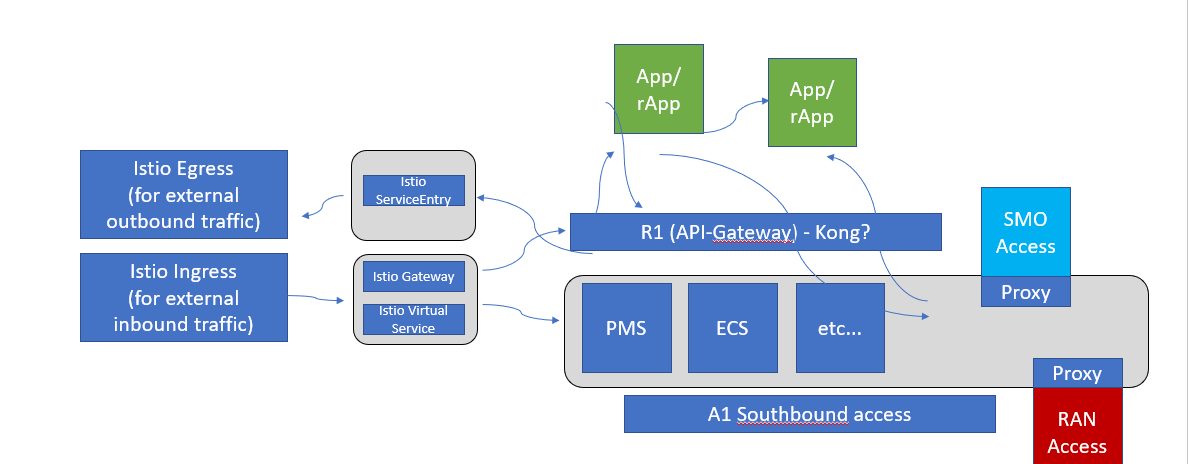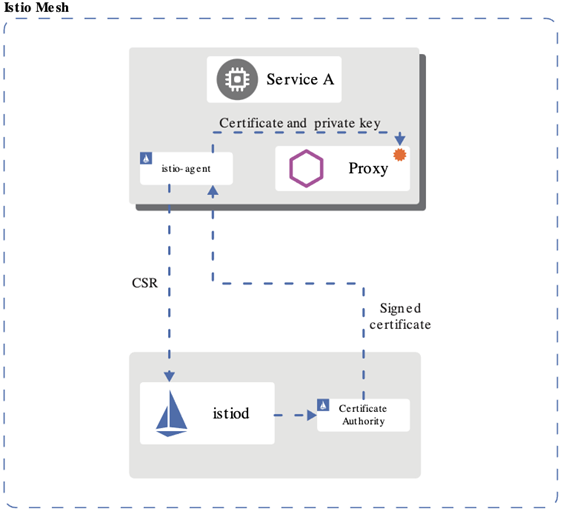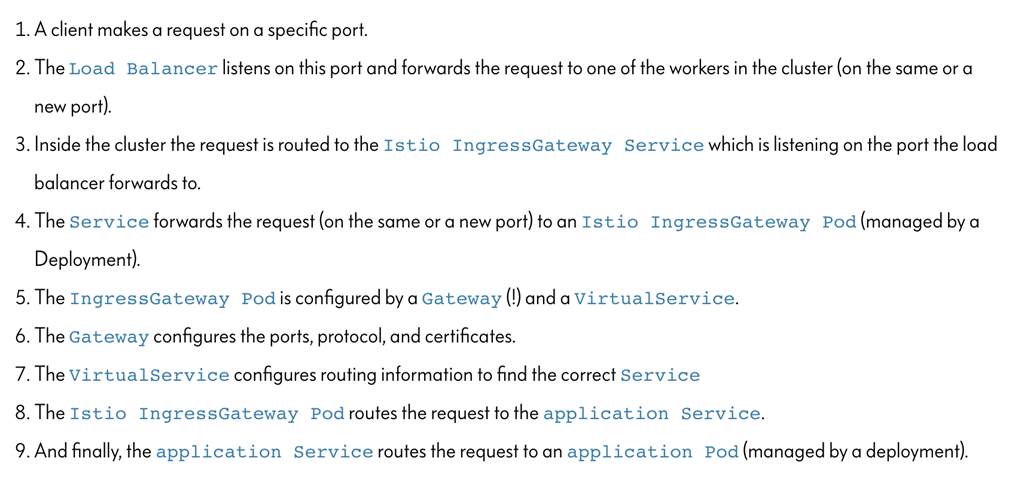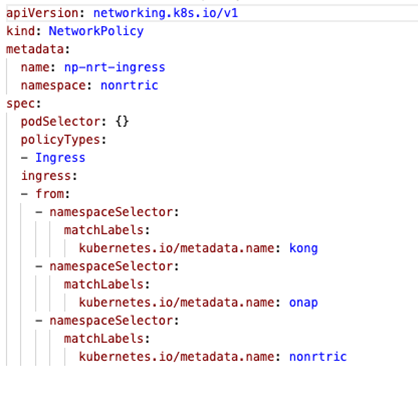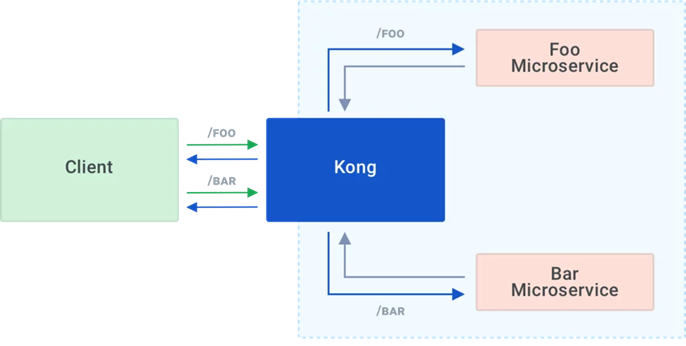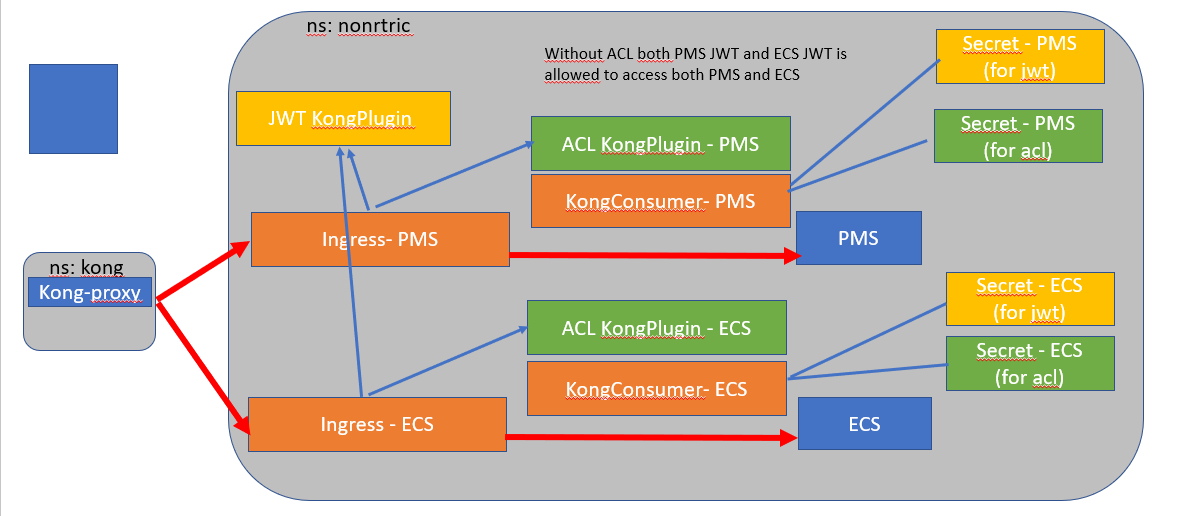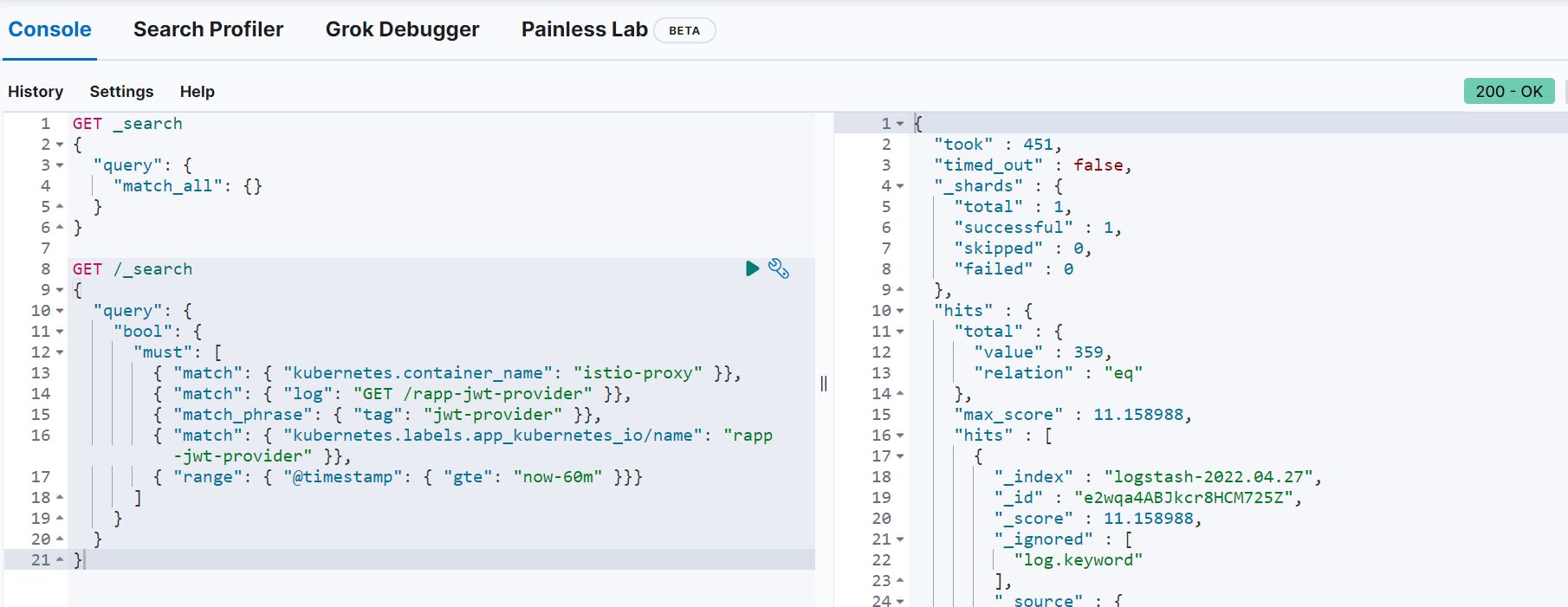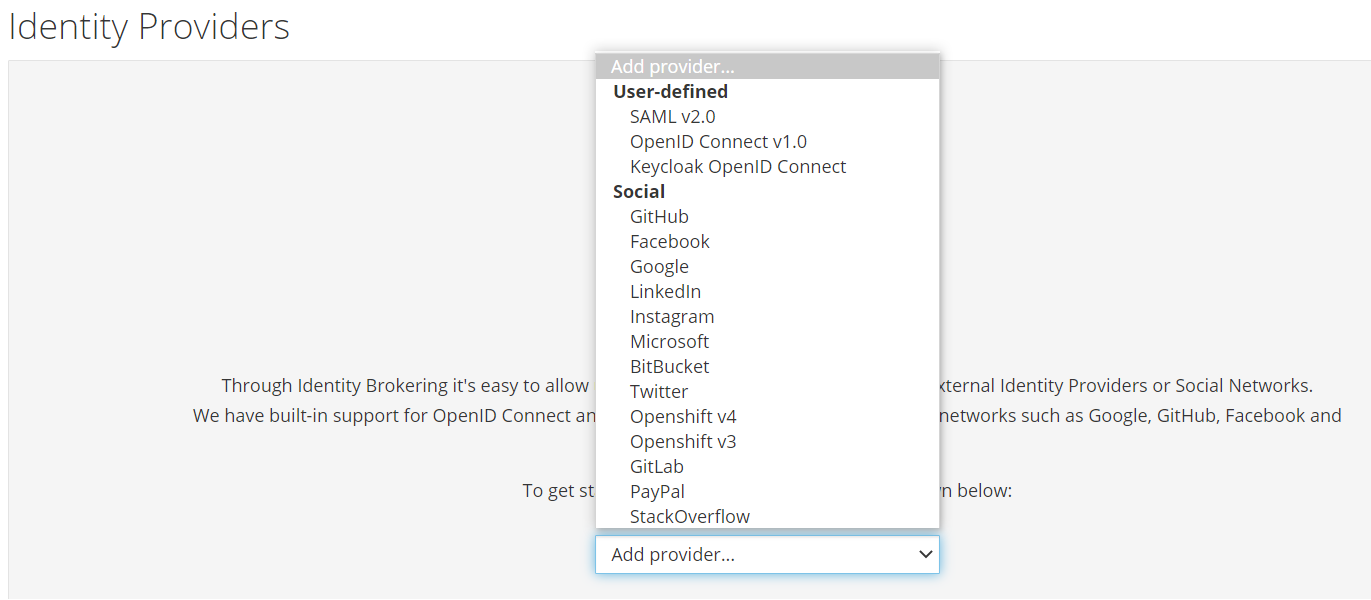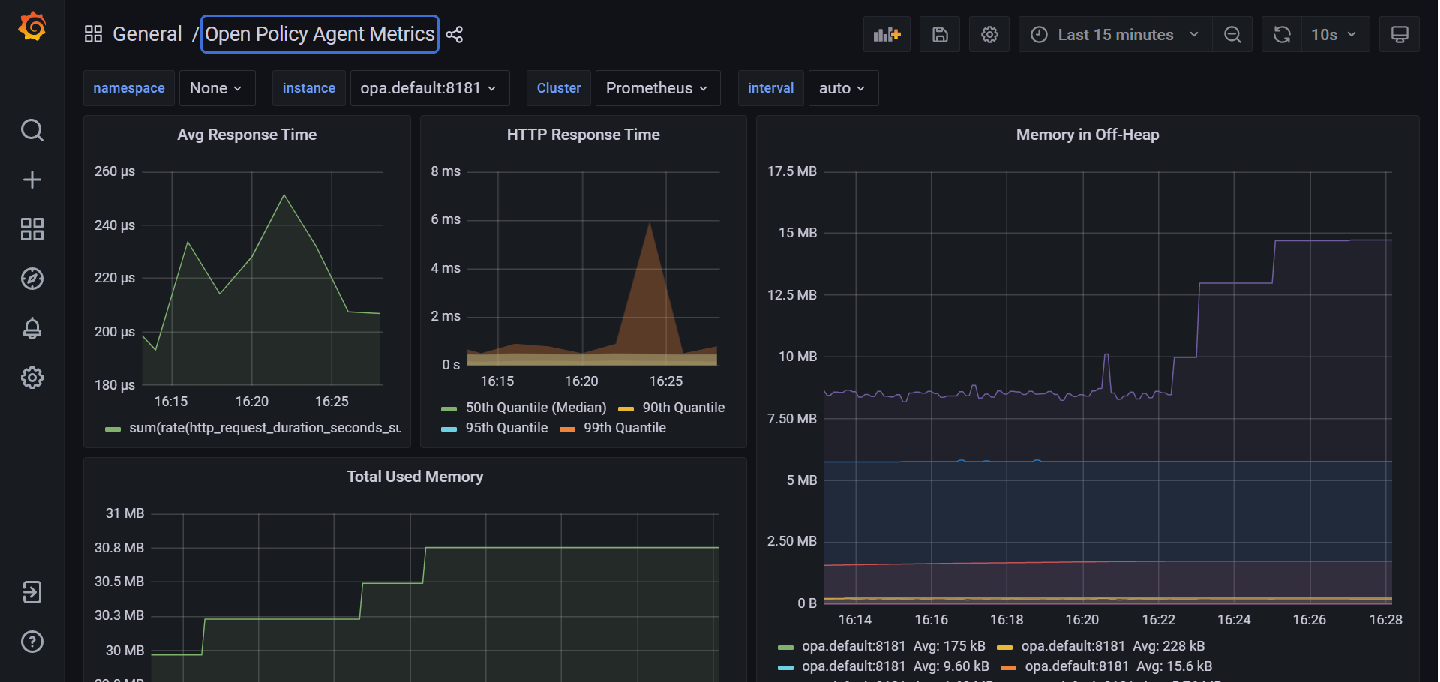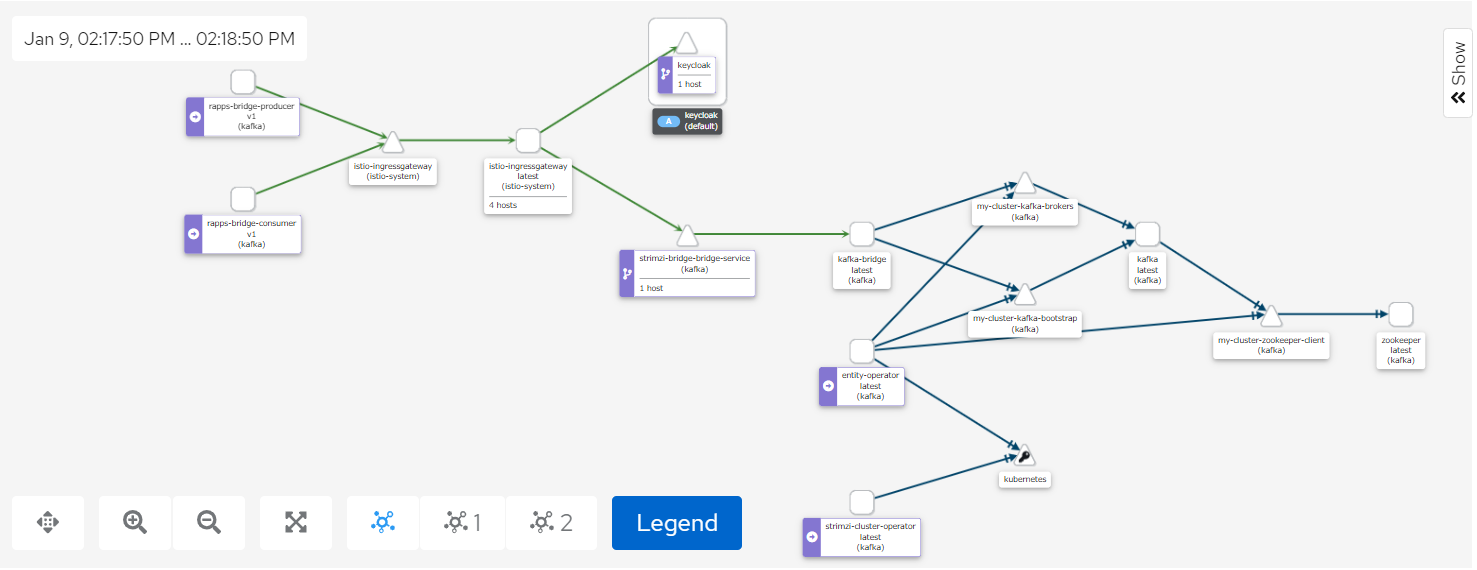| Table of Contents |
|---|
JIRA Ticket
| Jira | ||||||||||
|---|---|---|---|---|---|---|---|---|---|---|
|
ISTIO
Istio is a service mesh which provides a dedicated infrastructure layer that you can add to your applications. It adds capabilities like observability, traffic management, and security, without adding them to your own code.
...
| Code Block | ||||
|---|---|---|---|---|
| ||||
apiVersion: "security.istio.io/v1beta1"
kind: "PeerAuthentication"
metadata:
name: "default"
namespace: "istio-system"
spec:
mtls:
mode: STRICT |
JWT
JSON Web Token (JWT) is an open standard (RFC 7519) that defines a compact and self-contained way for securely transmitting information between parties as a JSON object.
...
| Code Block | ||||
|---|---|---|---|---|
| ||||
apiVersion: security.istio.io/v1beta1
kind: AuthorizationPolicy
metadata:
name: httpbin
namespace: foo
spec:
selector:
matchLabels:
app: httpbin
rules:
- from:
- source:
requestPrincipals: ["*"]
- to:
- operation:
paths: ["/healthz"] |
Use Case
KUBERNETES
K8S RBAC (Role Based Access Control) - supported by default in kubernetes.
K8S Service Account
- Kube use service account (sa) to validate api access
- SAs can be lined to a role via a binding
- A default sa, with no permissions (no bindings), is created in each namespace – pods uses this namespace unless otherwise specified
- Pods can be specified to run with a specific sa
- The helm manger needs a SA with cluster wide permission (to be able to list installed charts etc)
However, during installation the pod running the helm install/upgrade/delete should run with a sa with only namespace permission to ensure not other modification is made to kube objects outside the namespace
K8S RBAC - controlling access to kubernetes resources
- Role and and rolebinding objects defines who (sa, user or group) is allowed to do what in the kubernetes api
- Role object
- Sets permissions on resources in a specific namespace
- ClusterRole object
- Sets permission on non-namespaced resources or across namespaces
- RoleBinding object
- Binds one or more Role or a ClusterRole object(s) to a user, group or service account
- ClusterRoleBinding object
- Binds one or more ClusterRole object(s) to a user, group or service account
- No installation requried – RBAC enabled by default
Network Policies
- K8S supports Network Policy objects but a provider need to be install for the polcies to take effect, e.g. Calico
- Network policies can control ingress and/or egress traffic by selecting applicable pods - bacially controlling traffic between pods and/or network endpoints
- Several providers: Calico, Cillium etc
...
- Allow traffic from ns: kong (the gateway), nonrtric and onap
- Deny traffic from any other ns
KONG
Kong is Orchestration Microservice API Gateway. Kong provides a flexible abstraction layer that securely manages communication between clients and microservices via API. Also known as an API Gateway, API middleware or in some cases Service Mesh.
...
With client-side discovery, the client or API gateway making the request is responsible for identifying the location of the service instance and routing the request to it. The client begins by querying the service registry to identify the location of the available instances of the service and then determines which instance to use. See https://konghq.com/learning-center/microservices/service-discovery-in-a-microservices-architecture/
Kong datastore
Kong uses an external datastore to store its configuration such as registered APIs, Consumers and Plugins. Plugins themselves can store every bit of information they need to be persisted, for example rate-limiting data or Consumer credentials. See https://konghq.com/faqs/#:~:text=PostgreSQL%20is%20an%20established%20SQL%20database%20for%20use,Cassandra%20or%20PostgreSQL%2C%20Kong%20maintains%20its%20own%20cache.
Kong Demo
Demo of Kong gateway access control already available.
...
| Code Block | ||||
|---|---|---|---|---|
| ||||
apiVersion: configuration.konghq.com/v1
kind: KongPlugin
metadata:
name: app-jwt-kp
namespace: nonrtric
plugin: jwt
---
apiVersion: v1
kind: Secret
metadata:
name: pms-jwt-sec
namespace: nonrtric
type: Opaque
stringData:
kongCredType: jwt
key: pms-issuer
algorithm: RS256
rsa_public_key: |
-----BEGIN PUBLIC KEY-----
MIIBIjANBgkqhkiG9w0BAQEFAAOCAQ8AMIIBCgKCAQEAwetu4+suoz6c7e1kQz7I
Jmujci8zHpp4qh3nsmEL8e3QOKzMVsLuQPcF8lO1bBoChSA+KMNJ5rEixGWSxClp
9XroBSgrvjDsKtpPIlBQMnyOUYRSXWnIodmN+7wA72pTxo7JtAypPzRscSgi0OZt
9dtmv50RLr9Wph5cI+IE9OtgW58OKtdFRGigGHfdUEwrT/MPw2rOU85YRFaEgT/i
wcuQCe+Zmf2S2gVgK62u51ZFFn2VycJT1LcOt9cdqrSXYZAPfVKnQ/EgYvDdzFL1
x73JkrrSEP3pfrN4bXOnc7cS/S9Y2qk/I+QCR6a6XKmqk5SnWJSyXvKdYQJrgxJp
lQIDAQAB
-----END PUBLIC KEY-----
---
apiVersion: v1
kind: Secret
metadata:
name: ecs-jwt-sec
namespace: nonrtric
type: Opaque
stringData:
kongCredType: jwt
key: ecs-issuer
algorithm: RS256
rsa_public_key: |
-----BEGIN PUBLIC KEY-----
MIIBIjANBgkqhkiG9w0BAQEFAAOCAQ8AMIIBCgKCAQEAtminzTtNs5oqPCbg4uC1
L7MfR3B+uyYvkSKr3NFieRCxp6VhrgodJJXYc3SqXbaTVBkTwU24wG4UvJCnoRQd
0VhSawtLkN8XNAdCiD831dKUYMJPs43ZY/gO5CHVqUMdSHlp8dn7jNren59dvRRS
3xC1D3etXuEU01XGuLi/5qJLAKqDbYs3bH1vslTjndg1WTsrkU8GEIT1NphSYg25
s6rSLTIBfk8FjKquYHw3wYVSQK9rg2mqddJpRWkfZnazMHTmSNjOJpiNb77VLGSx
9qDbbLjurCl2mAG5Z+w76uKfKGgOo68SU0TL1sPybsKhAoZZg1gF06mvMln5eq5C
RQIDAQAB
-----END PUBLIC KEY-----
---
apiVersion: configuration.konghq.com/v1
kind: KongPlugin
metadata:
name: pms-group-acl-kp
namespace: nonrtric
plugin: acl
config:
whitelist: ['pms-group']
---
apiVersion: v1
kind: Secret
metadata:
name: pms-group-acl-sec
namespace: nonrtric
type: Opaque
stringData:
kongCredType: acl
group: pms-group
---
apiVersion: configuration.konghq.com/v1
kind: KongPlugin
metadata:
name: ecs-group-acl-kp
namespace: nonrtric
plugin: acl
config:
whitelist: ['ecs-group']
---
apiVersion: v1
kind: Secret
metadata:
name: ecs-group-acl-sec
namespace: nonrtric
type: Opaque
stringData:
kongCredType: acl
group: ecs-group
---
apiVersion: configuration.konghq.com/v1
kind: KongPlugin
metadata:
name: all-group-acl-kp
namespace: nonrtric
plugin: acl
config:
whitelist: ['ecs-group', 'pms-group']
---
apiVersion: configuration.konghq.com/v1
kind: KongConsumer
metadata:
name: pms-user-kc
namespace: nonrtric
annotations:
kubernetes.io/ingress.class: kong
username: pms-user
credentials:
- pms-jwt-sec
- pms-group-acl-sec
---
apiVersion: configuration.konghq.com/v1
kind: KongConsumer
metadata:
name: ecs-user-kc
namespace: nonrtric
annotations:
kubernetes.io/ingress.class: kong
username: ecs-user
credentials:
- ecs-jwt-sec
- ecs-group-acl-sec
---
apiVersion: networking.k8s.io/v1
kind: Ingress
metadata:
name: r1-pms-ing
namespace: nonrtric
annotations:
konghq.com/plugins: app-jwt-kp,pms-group-acl-kp
konghq.com/strip-path: "false"
spec:
ingressClassName: kong
rules:
- http:
paths:
- path: /a1-policy
pathType: ImplementationSpecific
backend:
service:
name: policymanagementservice
port:
number: 8081
---
apiVersion: networking.k8s.io/v1
kind: Ingress
metadata:
name: r1-ecs-ing
namespace: nonrtric
annotations:
konghq.com/plugins: app-jwt-kp,ecs-group-acl-kp
konghq.com/strip-path: "false"
spec:
ingressClassName: kong
rules:
- http:
paths:
- path: /data-consumer
pathType: ImplementationSpecific
backend:
service:
name: enrichmentservice
port:
number: 8083
- path: /data-producer
pathType: ImplementationSpecific
backend:
service:
name: enrichmentservice
port:
number: 8083
---
apiVersion: networking.k8s.io/v1
kind: Ingress
metadata:
name: r1-echo-ing
namespace: nonrtric
annotations:
konghq.com/plugins: app-jwt-kp,all-group-acl-kp
konghq.com/strip-path: "true"
spec:
ingressClassName: kong
rules:
- http:
paths:
- path: /echo
pathType: ImplementationSpecific
backend:
service:
name: httpecho
port:
number: 80 |
ISTIO Demo
- Install ISTIO on minikube using instruction here: Istio Installation - Simplified Learning (waytoeasylearn.com)
cd to the istio directory and install the demo application
kubectl create ns foo
kubectl apply -f <(istioctl kube-inject -f samples/httpbin/httpbin.yaml) -n foo
Create a python script to generate a JWT token using the code from here: https://medium.com/intelligentmachines/istio-jwt-step-by-step-guide-for-micro-services-authentication-690b170348fc . Install python_jwt using pip if it's not already installed.
- Create jwt-example.yaml using the public key generated by the python script:
kubectl create -f jwt-example.yaml
Code Block language yml title jwt-example.yaml apiVersion: "security.istio.io/v1beta1" kind: "RequestAuthentication" metadata: name: "jwt-example" namespace: istio-system spec: selector: matchLabels: istio: ingressgateway jwtRules: - issuer: "ISSUER" jwks: | { "keys":[{"e":"AQAB","kty":"RSA","n":"x_yYl4uW5c6NHOA-bDDh0MThFggBWl-vYJr77b9F1LmAtTlJVM0rL5klTfv2DmlAmD9eZPrWeUOoOGhSpe58XiSAvxyeaOrZhtyUjT3aglrSys0YBsB19ItNGMuoIuzPpWOrdtKwHa9rPbrdc6q7vb93qu2UVaIz-3FJmGFtSA5t8FK_5bZKF-oOzRLwqeVQ3n0Bu_dFDuGeZjQWMZF32QupyA-GF-tDGGriPLy9sutlB1NQyZ4qiSZx5UMxcfLwsWfQxHemdwLeZXWKWNBov8RmbZy2Jz-dwg6XjHBWAjTnCGG9p-bp63nUlnELI3LcEGhGOugZBqcpNT5dEAQ0fQ"}]} Export the JWT token generated by the python script as an environment variable:
export TOKEN="eyJhbGciOiJSUzI1NiIsInR5cCI6IkpXVCJ9.eyJhdWQiOiJBVURJRU5DRSIsImV4cCI6MTYzNzI1NDkxNSwiaWF0IjoxNjM3MjUxOTE1LCJpc3MiOiJJU1NVRVIiLCJqdGkiOiJCcmhDdEstcC00ZTF0RlBrZmpuSmhRIiwibmJmIjoxNjM3MjUxOTE1LCJwZXJtaXNzaW9uIjoicmVhZCIsInJvbGUiOiJ1c2VyIiwic3ViIjoiU1VCSkVDVCJ9.HrQCLPZXf0VkFe7JUVGXq-sHJQhVibqhToG4r63py-iwHWlUL02_WfoWRoxapgqGwImDdSlt1uG8RR-6VMqzWwGlcqBIRhFTG0nmzmtQjnOUs6QAKSUpA3PyWBIYHV0BwZbpo8Zq1Bo-sELy400fU-MCQ_054fSsG7JMBMmrnj8NyJmD2lNN0VSFGO53SPl2tQSVlc9OwAr8Uu0jfLPfUmh6yq43qFuxnVRfBGLLPNOt29aOfAetKLc72qlphtnbDx2a9teP5AIbkIWyIlhTytEnQRCwU4x8gDrEdkrHui4qCtzpl_uoITSwPe3AFsi7gQHB6rJoDj-j2zPc4rUTAA"export INGRESS_HOST=$(minikube ip)
export INGRESS_PORT=$(kubectl -n istio-system get service istio-ingressgateway -o jsonpath='{.spec.ports[?(@.name=="http2")].nodePort}')
Test the service:
curl --header "Authorization: Bearer $TOKEN" $INGRESS_HOST:$INGRESS_PORT/headers -s -o /dev/null -w "%{http_code}\n"You should get a response code of 200
Update the token to something invalid
The response will be 401
Istio Service JWT Test
istio-test.yaml (uses the default namespace)
...
See the latest version here: istio-test-latest.yaml
Istio with Keycloak
If you are using minikube on Ubuntu WSL you need to run "minikube service keycloak" to see keycloak ui.
...
Retrieve public key using : http(s)://<hostname>/auth/realms/<realm name>
Anchor keycloak keycloak
Enable keycloak with Istio
Setup a new realm, user and client as shown here : https://www.keycloak.org/getting-started/getting-started-kube
...
Note: The iss of the token will differ depending on how you retrieve it. If it's retrieved from within the cluster for URL will start with http://keycloak.default:8080/ otherwise it will be something like : http://192.168.49.2:31560/ (http://(minikube ip): (keycloak service nodePort))
Keycloak database
Keycloak uses the H2 database by default.
...
| Code Block | ||||
|---|---|---|---|---|
| ||||
spec:
initContainers:
- name: init-keycloak
image: busybox
command: ['sh', '-c', 'until nc -vz keycloak.default 8080; do echo waiting for keycloak; sleep 2; done;']
containers:
- name: a1-policy
image: hashicorp/http-echo
ports:
- containerPort: 5678
args:
- -text
- "Hello a1-policy" |
See also: keycloak.yaml
Keycloak Operator
Keycloak Operator Installation
Istio mTLS
Test: Istio / Mutual TLS Migration
...
Change namespace to istio-system to apply mTLS for the entire cluster.
Istio cert manager
https://istio.io/latest/docs/ops/integrations/certmanager/
Go Http Request Handler for Testing
| Anchor | ||||
|---|---|---|---|---|
|
nonrtric-server-go
| Code Block | ||||
|---|---|---|---|---|
| ||||
package main
import (
"fmt"
"log"
"github.com/gorilla/mux"
"net/http"
"encoding/json"
"io/ioutil"
"strings"
)
func requestHandler(w http.ResponseWriter, r *http.Request) {
w.Header().Set("Content-Type", "application/json")
params := mux.Vars(r)
var id = params["id"]
var data = params["data"]
var prefix = strings.Split(r.URL.Path, "/")[1]
switch r.Method {
case "GET":
if id == "" {
fmt.Println( "Received get request for "+ prefix +", params: nil\n")
fmt.Fprintf(w, "Response to get request for "+ prefix +", params: nil\n")
}else {
fmt.Println("Received get request for "+ prefix +", params: id=" + id + "\n")
fmt.Fprintf(w, "Response to get request for "+ prefix +", params: id=" + id + "\n")
}
case "POST":
body, err := ioutil.ReadAll(r.Body)
if err != nil {
panic(err.Error())
}
keyVal := make(map[string]string)
json.Unmarshal(body, &keyVal)
id := keyVal["id"]
data := keyVal["data"]
fmt.Println("Received post request for "+ prefix +", params: id=" + id +", data=" + data + "\n")
fmt.Fprintf(w, "Response to post request for "+ prefix +", params: id=" + id +", data=" + data + "\n")
case "PUT":
fmt.Println("Received put request for "+ prefix +", params: id=" + id +", data=" + data + "\n")
fmt.Fprintf(w, "Response to put request for "+ prefix +", params: id=" + id +", data=" + data + "\n")
case "DELETE":
fmt.Println("Received delete request for "+ prefix +", params: id=" + id + "\n")
fmt.Fprintf(w, "Response to delete request for "+ prefix +", params: id=" + id + "\n")
default:
fmt.Println("Received request for unsupported method, only GET, POST, PUT and DELETE methods are supported.")
fmt.Fprintf(w, "Error, only GET, POST, PUT and DELETE methods are supported.")
}
}
func main() {
router := mux.NewRouter()
var prefixArray [3]string = [3]string{"/a1-policy", "/data-consumer", "/data-producer"}
for _, prefix := range prefixArray {
router.HandleFunc(prefix, requestHandler)
router.HandleFunc(prefix+"/{id}", requestHandler)
router.HandleFunc(prefix+"/{id}/{data}", requestHandler)
}
log.Fatal(http.ListenAndServe(":8080", router))
} |
...
| Code Block | ||||
|---|---|---|---|---|
| ||||
FROM golang:1.15.2-alpine3.12 as build RUN apk add git RUN mkdir /build ADD . /build WORKDIR /build RUN go get github.com/gorilla/mux RUN go build -o nonrtric-server-go . FROM alpine:latest RUN mkdir /app WORKDIR /app/ # Copy the Pre-built binary file from the previous stage COPY --from=build /build . # Expose port 8080 EXPOSE 8080 # Run Executable CMD ["/app/nonrtric-server-go"] |
Testing
Update AuthorizationPolicy to only allow certain operations:
...
-----------------------------------------------------------------------
Number of Tests: 10, Tests Passed: 10, Tests Failed: 0
Date: 2021-12-06-14:48:33
-----------------------------------------------------------------------
Go Http Client for running inside cluster
| Anchor | ||||
|---|---|---|---|---|
|
nonrtric-client-go
| Code Block | ||||
|---|---|---|---|---|
| ||||
package main
import (
"fmt"
"net/http"
"net/url"
"encoding/json"
"time"
"io/ioutil"
"math/rand"
"strings"
"bytes"
"strconv"
"flag"
)
type Jwttoken struct {
Access_token string
Expires_in int
Refresh_expires_in int
Refresh_token string
Token_type string
Not_before_policy int
Session_state string
Scope string
}
var gatewayHost string
var gatewayPort string
var keycloakHost string
var keycloakPort string
var useGateway string
var letters = []rune("abcdefghijklmnopqrstuvwxyzABCDEFGHIJKLMNOPQRSTUVWXYZ")
func randSeq(n int) string {
b := make([]rune, n)
for i := range b {
b[i] = letters[rand.Intn(len(letters))]
}
return string(b)
}
func getToken(user string, password string, clientId string, realmName string) string {
keycloakUrl := "http://"+keycloakHost+":"+keycloakPort+"/auth/realms/"+realmName+"/protocol/openid-connect/token"
resp, err := http.PostForm(keycloakUrl,
url.Values{"username": {user}, "password": {password}, "grant_type": {"password"}, "client_id": {clientId}})
if err != nil {
fmt.Println(err)
panic("Something wrong with the credentials or url ")
}
defer resp.Body.Close()
body, err := ioutil.ReadAll(resp.Body)
var jwt Jwttoken
json.Unmarshal([]byte(body), &jwt)
return jwt.Access_token;
}
func MakeRequest(client *http.Client, prefix string, method string, ch chan<-string) {
var id = rand.Intn(1000)
var data = randSeq(10)
var service = strings.Split(prefix, "/")[1]
var gatewayUrl = "http://"+gatewayHost+":"+gatewayPort
var token = ""
var jsonValue []byte = []byte{}
var restUrl string = ""
if strings.ToUpper(useGateway) != "Y" {
gatewayUrl = "http://"+service+".istio-nonrtric:80"
//fmt.Println(gatewayUrl)
}
if service == "a1-policy" {
token = getToken("pmsuser", "secret","pmsclient", "pmsrealm")
}else{
token = getToken("icsuser", "secret","icsclient", "icsrealm")
}
if method == "POST" {
values := map[string]string{"id": strconv.Itoa(id), "data": data}
jsonValue, _ = json.Marshal(values)
restUrl = gatewayUrl+prefix
} else if method == "PUT" {
restUrl = gatewayUrl+prefix+"/"+strconv.Itoa(id)+"/"+data
} else {
restUrl = gatewayUrl+prefix+"/"+strconv.Itoa(id)
}
req, err := http.NewRequest(method, restUrl, bytes.NewBuffer(jsonValue))
if err != nil {
fmt.Printf("Got error %s", err.Error())
}
req.Header.Set("Content-type", "application/json")
req.Header.Set("Authorization", "Bearer "+token)
resp, err := client.Do(req)
if err != nil {
fmt.Printf("Got error %s", err.Error())
}
defer resp.Body.Close()
body, _ := ioutil.ReadAll(resp.Body)
respString := string(body[:])
if respString == "RBAC: access denied"{
respString += " for "+service+" "+strings.ToLower(method)+" request\n"
}
ch <- fmt.Sprintf("%s", respString)
}
func main() {
flag.StringVar(&gatewayHost, "gatewayHost", "192.168.49.2", "Gateway Host")
flag.StringVar(&gatewayPort, "gatewayPort" , "32162", "Gateway Port")
flag.StringVar(&keycloakHost, "keycloakHost", "192.168.49.2", "Keycloak Host")
flag.StringVar(&keycloakPort, "keycloakPort" , "31560", "Keycloak Port")
flag.StringVar(&useGateway, "useGateway" , "Y", "Connect to services hrough API gateway")
flag.Parse()
client := &http.Client{
Timeout: time.Second * 10,
}
ch := make(chan string)
var prefixArray [3]string = [3]string{"/a1-policy", "/data-consumer", "/data-producer"}
var methodArray [4]string = [4]string{"GET", "POST", "PUT", "DELETE"}
for true {
for _,prefix := range prefixArray{
for _,method := range methodArray{
go MakeRequest(client, prefix, method, ch)
}
}
for i := 0; i < len(prefixArray); i++ {
for j := 0; j < len(methodArray); j++ {
fmt.Println(<-ch)
}
}
time.Sleep(30 * time.Second)
}
} |
...
| Code Block | ||||
|---|---|---|---|---|
| ||||
apiVersion: "security.istio.io/v1beta1"
kind: "AuthorizationPolicy"
metadata:
name: "pms-policy"
namespace: istio-nonrtric
spec:
selector:
matchLabels:
apptype: nonrtric-pms
action: ALLOW
rules:
- from:
- source:
requestPrincipals: ["http://192.168.49.2:31560/auth/realms/pmsrealm/fab53fd0-3315-4e2f-bd17-6984fb7745f2"]
- source:
requestPrincipals: ["http://keycloak.default:8080/auth/realms/pmsrealm/fab53fd0-3315-4e2f-bd17-6984fb7745f2"]
to:
- operation:
methods: ["GET", "POST", "PUT", "DELETE"]
paths: ["/a1-policy*"]
when:
- key: request.auth.claims[role]
values: ["pms_admin"]
- from:
- source:
requestPrincipals: ["http://192.168.49.2:31560/auth/realms/pmsrealm/f96255ec-d553-4c2e-b106-0ed586ccab70"]
- source:
requestPrincipals: ["http://keycloak.default:8080/auth/realms/pmsrealm/f96255ec-d553-4c2e-b106-0ed586ccab70"]
to:
- operation:
methods: ["GET"]
paths: ["/a1-policy*"]
when:
- key: request.auth.claims[role]
values: ["pms_viewer"] |
pms_admin role:
Test 1: Testing GET /a1-policy
Received get request for a1-policy, params: nil
...
Test 5: Testing POST /a1-policy
Received post request for a1-policy, params: id=1003, data=abc
pms_viewer role:
Test 1: Testing GET /a1-policy
Received get request for a1-policy, params: nil
...
Anchor grafana grafana
Grafana
Istio also comes with grafana, to start it run : istioctl dashboard grafana
...
See also: Grafana playground
Prometheus
Start the prometheus dashboard by running: istioctl dashboard prometheus
...
You can then create your own dashboard in grafana using these metrics: rapps-requests.json
OAuth2 Proxy
Welcome to OAuth2 Proxy | OAuth2 Proxy (oauth2-proxy.github.io)
Calico network policy
https://docs.projectcalico.org/security/calico-network-policy
...
Following the example in the link above I installed the test application in a separate namespace (calico-test). Using curl I was able to access the database prior to applying the GlobalNetworkPolicy. After applying the policy the request timed out rather than return a 403 forbidden message.
Logging
| Anchor | ||||
|---|---|---|---|---|
|
Elasticsearch
We can use elasticsearch, kibana and fluentd to aggregate and visualize the kubernetes logs.
...
| Code Block | ||||
|---|---|---|---|---|
| ||||
PUT /_ilm/policy/cleanup_policy
{
"policy": {
"phases": {
"hot": {
"actions": {}
},
"delete": {
"min_age": "1d",
"actions": { "delete": {} }
}
}
}
}
PUT /logstash-*/_settings
{ "lifecycle.name": "cleanup_policy" }
PUT /_template/logging_policy_template
{
"index_patterns": ["logstash-*"],
"settings": { "index.lifecycle.name": "cleanup_policy" }
} |
Elasticsearch SDK
| Code Block | ||||
|---|---|---|---|---|
| ||||
package main
import (
"bytes"
"context"
"encoding/json"
"fmt"
"github.com/elastic/go-elasticsearch/esapi"
"github.com/elastic/go-elasticsearch/v8"
"io/ioutil"
"log"
"os/exec"
"strings"
)
func main() {
cmd := exec.Command("minikube", "ip")
stdout, err := cmd.Output()
ingressHost := strings.TrimSpace(string(stdout))
cmd = exec.Command("minikube", "ssh-key")
stdout, err = cmd.Output()
ingressKey := strings.TrimSpace(string(stdout))
// copy ca cert
cmd = exec.Command("scp", "-i", ingressKey, "docker@"+ingressHost+":/var/elasticsearch/config/certs/ca/ca.crt", "/mnt/c/Users/ktimoney/go/elastic/")
stdout, err = cmd.Output()
// get the elasticsearch service nodePort
cmd = exec.Command("kubectl", "get", "service", "elasticsearch", "-n", "logging",
"-o", "jsonpath={.spec.ports[?(@.port==9200)].nodePort}")
stdout, err = cmd.Output()
secureIngressPort := strings.TrimSpace(string(stdout))
clusterURLs := []string{"https://" + ingressHost + ":" + secureIngressPort}
username := "elastic"
password := "secret"
cert, _ := ioutil.ReadFile("./ca.crt")
// client configuration
cfg := elasticsearch.Config{
Addresses: clusterURLs,
Username: username,
Password: password,
CACert: cert,
}
ctx := context.Background()
es, err := elasticsearch.NewClient(cfg)
if err != nil {
log.Fatalf("Error creating the client: %s", err)
}
log.Println(elasticsearch.Version)
resp, err := es.Info()
if err != nil {
log.Fatalf("Error getting response: %s", err)
}
defer resp.Body.Close()
log.Println(resp)
// Index Query
indexResp, err := esapi.CatIndicesRequest{Format: "json", Pretty: true}.Do(ctx, es)
if err != nil {
return
}
indexBody := &indexResp.Body
defer indexResp.Body.Close()
fmt.Println(indexResp.String())
body, err := ioutil.ReadAll(*indexBody)
var results []map[string]interface{}
json.Unmarshal(body, &results)
fmt.Printf("Index: %+v\n", results)
indexName := fmt.Sprintf("%v", results[len(results)-1]["index"])
query := `{"query": {"match" : {"log": "token"}},"size": 3}`
runQuery(es, ctx, indexName, query)
query = `
{
"query": {
"bool": {
"must": [
{ "match": { "kubernetes.container_name": "istio-proxy" }},
{ "match": { "log": "token" }},
{ "match": { "kubernetes.labels.app_kubernetes_io/name": "rapp-jwt-invoker" }},
{ "range": { "@timestamp": { "gte": "now-60m" }}}
]
}
},"size": 1
}
`
runQuery(es, ctx, indexName, query)
query = `
{
"query": {
"bool": {
"must": [
{ "match": { "kubernetes.container_name": "istio-proxy" }},
{ "match": { "log": "GET /rapp-jwt-provider" }},
{ "match": { "kubernetes.labels.app_kubernetes_io/name": "rapp-jwt-provider" }},
{ "match_phrase": { "tag": "jwt-provider" }},
{ "range": { "@timestamp": { "gte": "now-60m" }}}
]
}
},"size": 1
}
`
runQuery(es, ctx, indexName, query)
}
func runQuery(es *elasticsearch.Client, ctx context.Context, indexName string, query string) {
// Query indexName
var mapResp map[string]interface{}
var buf bytes.Buffer
var b strings.Builder
b.WriteString(query)
read := strings.NewReader(b.String())
// Attempt to encode the JSON query and look for errors
if err := json.NewEncoder(&buf).Encode(read); err != nil {
log.Fatalf("Error encoding query: %s", err)
// Query is a valid JSON object
} else {
fmt.Println("\njson.NewEncoder encoded query:", read, "\n")
}
// Pass the JSON query to client's Search() method
searchResp, err := es.Search(
es.Search.WithContext(ctx),
es.Search.WithIndex(indexName),
es.Search.WithBody(read),
es.Search.WithTrackTotalHits(true),
es.Search.WithPretty(),
)
if err != nil {
log.Fatalf("Elasticsearch Search() API ERROR:", err)
}
defer searchResp.Body.Close()
// Decode the JSON response and using a pointer
if err := json.NewDecoder(searchResp.Body).Decode(&mapResp); err != nil {
log.Fatalf("Error parsing the response body: %s", err)
}
// Iterate the document "hits" returned by API call
for _, hit := range mapResp["hits"].(map[string]interface{})["hits"].([]interface{}) {
// Parse the attributes/fields of the document
doc := hit.(map[string]interface{})
// The "_source" data is another map interface nested inside of doc
source := doc["_source"]
// Get the document's _id and print it out along with _source data
docID := doc["_id"]
fmt.Println("docID:", docID)
fmt.Println("_source:", source, "\n")
// extract the @timestamp field
timeStamp := fmt.Sprintf("%v", source.(map[string]interface{})["@timestamp"])
fmt.Println("timeStamp:", timeStamp)
// extract the tag field
tag := fmt.Sprintf("%v", source.(map[string]interface{})["tag"])
fmt.Println("tag:", tag)
// extract the log field
k8slog := fmt.Sprintf("%v", source.(map[string]interface{})["log"])
fmt.Println("log:", k8slog)
}
hits := int(mapResp["hits"].(map[string]interface{})["total"].(map[string]interface{})["value"].(float64))
fmt.Println("Matches:", hits)
} |
...
You can run the same query in elasticsearch dev-tools:
Quick Installation Guide
- Download and install istio: istioctl install --set profile=demo
- cd to the samples/addons/ directory and install the dashboards e.g. kubectl create -f kiali.yaml
- Install postgres: istioctl kube-inject -f postgres.yaml | kubectl apply -f - (change the hostPath path value to a path on your host)
- Install keycloak: istioctl kube-inject -f keycloak.yaml | kubectl apply -f -
- Open the keycloak admin console and setup the required realms, users and clients
- Setup the "pms_admin" and "pms_viewer" roles for pmsuser and pmsuser2 respectively.
- Install Coordinated Service Exposurenonrtric-server-go: docker build -t nonrtric-server-go:latest .
- Create the istio-nonrtric namespace: kubectl create namespace istio-nonrtric
- Enable istio for the istio-nonrtric namespace: kubectl label namespace istio-nonrtric istio-injection=enabled
- Edit the istio-test.yaml so the host ip specified matches yours.
- Also change the userid in the requestPrincipals field to match yours
- Install istio-test.yaml : kubectl create -f istio-test.yaml
- Install Coordinated Service Exposure nonrtric-client-go: docker build -t nonrtric-client-go:latest .
- Install the test client: istioctl kube-inject -f client.yaml | kubectl apply -f -
- Open the kiali dashboard to check your services are up and running
- Open the grafana to view the istio dashboard
- Optionally install Coordinated Service Exposure elasticsearch
ONAP
ONAP Next Generation Security & Logging Architecture
GO Client
Create kubernetes jobs in golang
...
There is also a helm sdk you can use:
HELM SDK
| Code Block | ||||
|---|---|---|---|---|
| ||||
package main
import (
"fmt"
"os"
"log"
"k8s.io/cli-runtime/pkg/genericclioptions"
"k8s.io/client-go/rest"
"helm.sh/helm/v3/pkg/action"
"helm.sh/helm/v3/pkg/chart/loader"
)
func main() {
chartPath := "/tmp/wordpress-12.3.3.tgz"
chart, err := loader.Load(chartPath)
releaseName := "wordpress"
releaseNamespace := "default"
actionConfig, err := getActionConfig(releaseNamespace)
if err != nil {
panic(err)
}
listAction := action.NewList(actionConfig)
releases, err := listAction.Run()
if err != nil {
log.Println(err)
}
for _, release := range releases {
log.Println("Release: " + release.Name + " Status: " + release.Info.Status.String())
}
iCli := action.NewInstall(actionConfig)
iCli.Namespace = releaseNamespace
iCli.ReleaseName = releaseName
rel, err := iCli.Run(chart, nil)
if err != nil {
fmt.Println(err)
}
fmt.Println("Successfully installed release: ", rel.Name)
}
func getActionConfig(namespace string) (*action.Configuration, error) {
actionConfig := new(action.Configuration)
// Create the rest config instance with ServiceAccount values loaded in them
config, err := rest.InClusterConfig()
if err != nil {
// fallback to kubeconfig
home, exists := os.LookupEnv("HOME")
if !exists {
home = "/root"
}
kubeconfigPath := filepath.Join(home, ".kube", "config")
if envvar := os.Getenv("KUBECONFIG"); len(envvar) >0 {
kubeconfigPath = envvar
}
if err := actionConfig.Init(kube.GetConfig(kubeconfigPath, "", namespace), namespace, os.Getenv("HELM_DRIVER"),
func(format string, v ...interface{}) {
fmt.Sprintf(format, v)
}); err != nil {
panic(err)
}
} else {
// Create the ConfigFlags struct instance with initialized values from ServiceAccount
var kubeConfig *genericclioptions.ConfigFlags
kubeConfig = genericclioptions.NewConfigFlags(false)
kubeConfig.APIServer = &config.Host
kubeConfig.BearerToken = &config.BearerToken
kubeConfig.CAFile = &config.CAFile
kubeConfig.Namespace = &namespace
if err := actionConfig.Init(kubeConfig, namespace, os.Getenv("HELM_DRIVER"), func(format string, v ...interface{}) {
fmt.Sprintf(format, v)
}); err != nil {
panic(err)
}
}
return actionConfig, nil
} |
...
The method getActionConfig works for both in-cluster deployments and from the localhost. It determines which one to use by calling the rest.InClusterConfig() function.
GO CLIENT SDK
Here are another couple of programs that demonstrate how to use the go client:
...
There is also support for istio in client go Istio client-go
ISTIO SDK
| Code Block | ||||
|---|---|---|---|---|
| ||||
package main
import (
"context"
"bytes"
"fmt"
"os"
"log"
"path/filepath"
k8Yaml "k8s.io/apimachinery/pkg/util/yaml"
metav1 "k8s.io/apimachinery/pkg/apis/meta/v1"
clientcmd "k8s.io/client-go/tools/clientcmd"
versioned "istio.io/client-go/pkg/clientset/versioned"
v1beta1 "istio.io/client-go/pkg/apis/security/v1beta1"
securityv1beta1 "istio.io/api/security/v1beta1"
typev1beta1 "istio.io/api/type/v1beta1"
)
const (
NAMESPACE = "default"
)
const authorizationPolicyManifest = `
apiVersion: "security.istio.io/v1beta1"
kind: "AuthorizationPolicy"
metadata:
name: "pms-policy"
namespace: default
spec:
selector:
matchLabels:
apptype: nonrtric-pms
action: ALLOW
rules:
- from:
- source:
principals: ["cluster.local/ns/default/sa/goclient"]
to:
- operation:
methods: ["GET", "POST", "PUT", "DELETE"]
paths: ["/a1-policy*"]
hosts: ["a1-policy*"]
ports: ["8080"]
when:
- key: request.auth.claims[role]
values: ["pms_admin"]
`
func connectToK8s() *versioned.Clientset {
home, exists := os.LookupEnv("HOME")
if !exists {
home = "/root"
}
configPath := filepath.Join(home, ".kube", "config")
config, err := clientcmd.BuildConfigFromFlags("", configPath)
if err != nil {
log.Fatalln("failed to create K8s config")
}
ic, err := versioned.NewForConfig(config)
if err != nil {
log.Fatalf("Failed to create istio client: %s", err)
return ic
}
func createAuthorizationPolicy(clientset *versioned.Clientset) {
authClient := clientset.SecurityV1beta1().AuthorizationPolicies(NAMESPACE)
auth := &v1beta1.AuthorizationPolicy{}
dec := k8Yaml.NewYAMLOrJSONDecoder(bytes.NewReader([]byte(authorizationPolicyManifest)), 1000)
if err := dec.Decode(&auth); err != nil {
fmt.Println(err)
}
result, err := authClient.Create(context.TODO(), auth, metav1.CreateOptions{})
if err!=nil {
panic(err.Error())
}
fmt.Printf("Create Authorization Policy %s \n", result.GetName())
}
func createAuthorizationPolicy2(clientset *versioned.Clientset) {
authClient := clientset.SecurityV1beta1().AuthorizationPolicies(NAMESPACE)
auth := &v1beta1.AuthorizationPolicy{
ObjectMeta: metav1.ObjectMeta{
Name: "ics-policy",
},
Spec: securityv1beta1.AuthorizationPolicy {
Selector: &typev1beta1.WorkloadSelector{
MatchLabels: map[string]string{
"apptype" : "nonrtric-ics",
},
},
Action: securityv1beta1.AuthorizationPolicy_ALLOW,
Rules: []*securityv1beta1.Rule{{
From: []*securityv1beta1.Rule_From{{
Source: &securityv1beta1.Source{
Namespaces : []string{
"default",
},
},
},},
To: []*securityv1beta1.Rule_To{{
Operation: &securityv1beta1.Operation{
Methods : []string{
"GET", "POST", "PUT", "DELETE",
},
Paths : []string{
"/data-*",
},
Hosts : []string{
"data-consumer*", "data-producer*",
},
Ports : []string{
"8080",
},
},
},},
},},
},
}
result, err := authClient.Create(context.TODO(), auth, metav1.CreateOptions{})
if err!=nil {
panic(err.Error())
}
fmt.Printf("Create Authorization Policy %s \n", result.GetName())
}
func main() {
clientset := connectToK8s()
createAuthorizationPolicy(clientset)
createAuthorizationPolicy2(clientset)
} |
...
keycloak aslo has a client called gocloak
GOCLOAK SDK
| Code Block | ||||
|---|---|---|---|---|
| ||||
package main
import (
"github.com/Nerzal/gocloak/v10"
"context"
"fmt"
)
func main(){
client := gocloak.NewClient("http://192.168.49.2:31560")
ctx := context.Background()
token, err := client.LoginAdmin(ctx, "admin", "admin", "master")
if err != nil {
fmt.Println(err)
panic("Something wrong with the credentials or url")
}
realmRepresentation := gocloak.RealmRepresentation{
ID: gocloak.StringP("testRealm"),
Realm: gocloak.StringP("testRealm"),
DisplayName: gocloak.StringP("testRealm"),
Enabled: gocloak.BoolP(true),
}
realm, err := client.CreateRealm(ctx, token.AccessToken, realmRepresentation)
if err != nil {
fmt.Println(err)
panic("Oh no!, failed to create realm :(")
} else {
fmt.Println("Created new realm", realm)
}
newClient := gocloak.Client{
ClientID: gocloak.StringP("testClient"),
Enabled: gocloak.BoolP(true),
DirectAccessGrantsEnabled: gocloak.BoolP(true),
BearerOnly: gocloak.BoolP(false),
PublicClient: gocloak.BoolP(true),
}
clientId, err := client.CreateClient(ctx, token.AccessToken, realm, newClient)
if err != nil {
fmt.Println(err)
panic("Oh no!, failed to create client :(")
} else {
fmt.Println("Created new client", clientId)
}
newUser := gocloak.User{
FirstName: gocloak.StringP("Bob"),
LastName: gocloak.StringP("Uncle"),
Email: gocloak.StringP("something@really.wrong"),
Enabled: gocloak.BoolP(true),
Username: gocloak.StringP("testUser"),
}
userId, err := client.CreateUser(ctx, token.AccessToken, realm, newUser)
if err != nil {
fmt.Println(err)
panic("Oh no!, failed to create user :(")
} else {
fmt.Println("Created new user", userId)
}
err = client.SetPassword(ctx, token.AccessToken, userId, realm, "secret", false)
if err != nil {
fmt.Println(err)
panic("Oh no!, failed to set password :(")
} else {
fmt.Println("Set password for user")
}
removeRoles := []gocloak.Role{}
origRoles, err := client.GetRealmRoles(ctx, token.AccessToken, realm, gocloak.GetRoleParams{})
if err != nil {
fmt.Println(err)
panic("Oh no!, failed to retreive roles :(")
} else {
fmt.Println("Retrieved roles")
}
for _, r := range origRoles {
removeRoles = append(removeRoles, *r)
}
newRole := gocloak.Role{
Name: gocloak.StringP("testRole"),
}
roleName, err := client.CreateRealmRole(ctx, token.AccessToken, realm, newRole)
if err != nil {
fmt.Println(err)
panic("Oh no!, failed to create role :(")
} else {
fmt.Println("Created new role", roleName)
}
role, err := client.GetRealmRole(ctx, token.AccessToken, realm, roleName)
if err != nil {
fmt.Println(err)
panic("Oh no!, failed to retrieve role :(")
} else {
fmt.Println("Retrieved role")
}
roles := []gocloak.Role{}
roles = append(roles, *role)
err = client.AddRealmRoleToUser(ctx, token.AccessToken, realm, userId, roles)
if err != nil {
fmt.Println(err)
panic("Oh no!, failed to add role to user :(")
} else {
fmt.Println("Role added to user")
}
err = client.DeleteRealmRoleFromUser(ctx, token.AccessToken, realm, userId, removeRoles)
if err != nil {
fmt.Println(err)
panic("Oh no!, failed to remove roles from user :(")
} else {
fmt.Println("Roles removed from user")
}
newMapper := gocloak.ProtocolMapperRepresentation{
ID: gocloak.StringP("testMapper"),
Name: gocloak.StringP("testMapper"),
Protocol: gocloak.StringP("openid-connect"),
ProtocolMapper: gocloak.StringP("oidc-usermodel-realm-role-mapper"),
Config: &map[string]string{
"access.token.claim": "true",
"aggregate.attrs": "",
"claim.name": "role",
"id.token.claim": "true",
"jsonType.label": "String",
"multivalued": "",
"userinfo.token.claim": "true",
},
}
_, err = client.CreateClientProtocolMapper(ctx, token.AccessToken, realm, clientId, newMapper)
if err != nil {
fmt.Println(err)
panic("Oh no!, failed to add roleampper to client :(")
} else {
fmt.Println("Rolemapper added to client")
}
}
|
...
| Code Block | ||||
|---|---|---|---|---|
| ||||
when:
- key: request.auth.claims[clientRole]
values: ["hwclientrole"] |
Keycloak Client Authenticator
Using X509 certificates
Create the server side certificates using the following script
...
Java example available here: X.509 Authentication in Spring Security
Istio CA Certs
To allow istio to work with keycloak you must add your certificate to the istio certs when you're installing.
...
Further instruction are available here: Custom CA Integration using Kubernetes CSR
Using istio-gateway to obtain JWT tokens.
You may want to avoid connecting directly to the keycloak server for security reasons.
...
Note: The file above also allows for http calls to keycloak through the gateway, the ISS in this case is: "http://istio-ingressgateway.istio-system:80/auth/realms/<realm>". In this case the jwksUri ahould be set to the default URI for in-cluster keycloak calls i.e. "http://keycloak.default:8080/auth/realms/<realm>/protocol/openid-connect/certs"
Client authentication with signed JWT
Another option for retrieving JWT tokens for confidentail clients is using client authentication with signed JWT.
...
Note: we can also call this using https with some small modifications.
Client authentication with signed JWT with client secret
This is similar to the option above except we sign with the client secret instead of the private key.
...
| Code Block | ||||
|---|---|---|---|---|
| ||||
secret := "NKTh1bfR9HNwllMhdWrDMKhVJHTvwreC"
token, err := jwt.NewWithClaims(jwt.SigningMethodHS256, claims).SignedString([]byte(secret))
if err != nil {
return "", fmt.Errorf("create: sign token: %w", err)
} |
Client keys tab
The client offer many different ways of configuring the authenticatio keys.
...
| Code Block | ||||
|---|---|---|---|---|
| ||||
claims["iss"] = "jwtclient3"
claims["aud"] = "https://192.168.49.2:31561/auth/realms/x509"
token := jwt.NewWithClaims(jwt.SigningMethodRS256, claims)
token.Header["kid"] = "AKAwbsKtqu9OmIwIsPOUf5zTJkIC73hzY9Myv4srjTs"
tokenString, err := token.SignedString(key)
if err != nil {
return "", fmt.Errorf("create: sign token: %w", err)
}
return tokenString, nil
} |
Keycloak Authorization code grant
The OAuth Authorization Code Grant flow is recommended if your application support redirects.
e.g. your application is a Web application or a mobile application.
...
Login will trigger a call to the /callback endpoint whcih in turn gets the JWT token and returns it to the user.
PKCE
PKCE stands for Proof Key for Code Exchange and the PKCE-enhanced Authorization Code Flow builds upon the standard Authorization Code Flow and it provides an additional level of security for OAuth clients.
...
curl -H "Authorization: Bearer $TOKEN" localhost:9000
Hello World OAuth2!
See also: golang oauth2
Keycloak Rest API
Documentation for the keycloak Rest API is available here: Keycloak Admin REST API
...
| Code Block | ||||
|---|---|---|---|---|
| ||||
export ADMIN_TKN=$(curl -s -X POST --insecure https://$HOST:$KEYCLOAK_PORT/auth/realms/master/protocol/openid-connect/token \
-H "Content-Type: application/x-www-form-urlencoded" \
-d "username=admin" \
-d 'password=admin' \
-d 'grant_type=password' \
-d 'client_id=admin-cli' | jq -r '.access_token')
echo "ADMIN CLIENT TOKEN = $ADMIN_TKN"
curl -X POST --insecure https://$HOST:$KEYCLOAK_PORT/auth/admin/realms/x509provider/clients \
-H "authorization: Bearer $ADMIN_TKN" \
-H "Content-Type: application/json" \
--data \
'
{
"id": "x509Client",
"name": "x509Client",
"enabled": "true",
"defaultClientScopes": ["email"],
"redirectUris": ["*"],
"attributes": {"use.refresh.tokens": "true", "client_credentials.use_refresh_token": "true"}
}
' |
Keycloak SSO & User management
Identity Providers
You can use keycloak for single-sign so users don't have to login to each application individually.
...
See the "Identity Providers" menu in the keycloak UI.
User Federation
You can also use existing LDAP, active directory servers or relational databases for user management if this is required.
...
See the "User Federation" menu in the keycloak UI.
Keycloak Authorization services
...
Sample External Authorization Server with Istio
Working example
- To use keycloak authoriztion services start by creating a confidential client.
- Set "Authoriztion Enabled" to on.
- Create 2 roles rapp_admin and rapp_user and assigned them to the service account.
- Click on the authoriztion tab for the client to setup your authoriztion policies.
- Start by creating 4 scopes (create,edit, delete and view) in the "Authoriztion scopes" section
- Next create a resource "Rapp resource", set the URI to /api/resources/* and set the scopes to create,edit, delete and view.
- Next create a policy "View Policy", select the "rapp_user" role and set required to on.
- Create an "Admin policy", select the "rapp_admin" role and set required to on.
- In the permission section, create a "Scope Based" permission - for resouce choose the "Rapp resource" created earlier, scope should be set to view and select the "View Policy" for policy.
- Create another "Scope Based" permission - for resouce choose the "Rapp resource" created earlier, scope should be set to create, edit and delete and select the "Admin Policy" for policy.
...
PUT request using service account requesting party token
PUT resources 1
OPA
The Open Policy Agent (OPA) is an open source, general-purpose policy engine that unifies policy enforcement across the stack. OPA provides a high-level declarative language that lets you specify policy as code and simple APIs to offload policy decision-making from your software.
...
GO
Go provides a library for opa.
...
| Code Block | ||||
|---|---|---|---|---|
| ||||
package main
import (
"context"
"encoding/json"
"fmt"
"github.com/open-policy-agent/opa/rego"
"io/ioutil"
"net/http"
"net/url"
"os"
)
type Jwttoken struct {
Access_token string
Expires_in int
Refresh_expires_in int
Refresh_token string
Token_type string
Not_before_policy int
Session_state string
Scope string
}
var token Jwttoken
var opaPolicy string = `
package authz
import future.keywords.in
default allow = false
jwks := jwks_request("http://keycloak:8080/auth/realms/opa/protocol/openid-connect/certs").body
filtered_jwks := [ key |
some key in jwks.keys
key.use == "sig"
]
token_cert := json.marshal({"keys": filtered_jwks})
token = { "isValid": isValid, "header": header, "payload": payload } {
[isValid, header, payload] := io.jwt.decode_verify(input, { "cert": token_cert, "aud": "account", "iss": "http://keycloak:808
0/auth/realms/opa"})
}
allow {
is_token_valid
}
is_token_valid {
token.isValid
now := time.now_ns() / 1000000000
token.payload.iat <= now
now < token.payload.exp
token.payload.clientRole == "[opa-client-role]"
}
jwks_request(url) = http.send({
"url": url,
"method": "GET",
"force_cache": true,
"force_json_decode": true,
"force_cache_duration_seconds": 3600 # Cache response for an hour
})
`
func getToken() string {
clientSecret := "63wkv0RUXkp01pbqtNTSwghhTxeMW55I"
clientId := "opacli"
realmName := "opa"
keycloakHost := "keycloak"
keycloakPort := "8080"
keycloakUrl := "http://" + keycloakHost + ":" + keycloakPort + "/auth/realms/" + realmName + "/protocol/openid-connect/token" resp, err := http.PostForm(keycloakUrl,
url.Values{"client_secret": {clientSecret}, "grant_type": {"client_credentials"}, "client_id": {clientId}})
if err != nil {
fmt.Println(err)
panic("Something wrong with the credentials or url ")
}
defer resp.Body.Close()
body, err := ioutil.ReadAll(resp.Body)
json.Unmarshal([]byte(body), &token)
return token.Access_token
}
func traceOpa(input string) {
ctx := context.TODO()
test := rego.New(
rego.Query("x = data.authz.allow"),
rego.Trace(true),
rego.Module("example.rego", opaPolicy),
rego.Input(input),
)
test.Eval(ctx)
rego.PrintTraceWithLocation(os.Stdout, test)
}
func evaluateOpa(input string) {
ctx := context.TODO()
query, err := rego.New(
rego.Query("x = data.authz.allow"),
rego.Module("example.rego", opaPolicy),
).PrepareForEval(ctx)
if err != nil {
// Handle error.
fmt.Println(err.Error())
}
results, err := query.Eval(ctx, rego.EvalInput(input))
// Inspect results.
if err != nil {
// Handle evaluation error.
fmt.Println("Error: " + err.Error())
} else if len(results) == 0 {
// Handle undefined result.
fmt.Println("Results are empty")
} else {
// Handle result/decision.
fmt.Printf("Results = %+v\n", results) //=> [{Expressions:[true] Bindings:map[x:true]}]
}
}
func main() {
tokenStr := getToken()
traceOpa(tokenStr)
evaluateOpa(tokenStr)
}
|
OPA bundles and dynamic composition
Method 1
We can combined OPA bundles with dynamic composition to provide different policies for differect services.
...
| Code Block | ||||
|---|---|---|---|---|
| ||||
#!/bin/bash
INGRESS_HOST=$(minikube ip)
INGRESS_PORT=$(kubectl -n istio-system get service istio-ingressgateway -o jsonpath='{.spec.ports[?(@.name=="http2")].nodePort}')
TESTS=0
PASSED=0
FAILED=0
TEST_TS=$(date +%F-%T)
TOKEN=""
ACCESS_TOKEN=""
REFRESH_TOKEN=""
function get_token
{
local prefix="${1}"
url="http://${KEYCLOAK_HOST}:${KEYCLOAK_PORT}/auth/realms"
TOKEN=$(curl -s -X POST $url/opa/protocol/openid-connect/token -H \
"Content-Type: application/x-www-form-urlencoded" -d client_secret=63wkv0RUXkp01pbqtNTSwghhTxeMW55I \
-d 'grant_type=client_credentials' -d client_id=opacli)
ACCESS_TOKEN=$(echo $TOKEN | jq -r '.access_token')
}
function run_test
{
local prefix="${1}" type=${2} msg="${3}" data=${4}
TESTS=$((TESTS+1))
echo "Test ${TESTS}: Testing $type /${prefix}"
get_token $prefix
url=$INGRESS_HOST:$INGRESS_PORT"/"$prefix
result=$(curl -s -X ${type} -H "Content-type: application/json" -H "Authorization: Bearer $ACCESS_TOKEN" $url)
echo $result
if [ "$result" != "$msg" ]; then
echo "FAIL"
FAILED=$((FAILED+1))
else
echo "PASS"
PASSED=$((PASSED+1))
fi
echo ""
}
run_test "rapp-opa-provider" "GET" "Hello OPA World!" ""
echo
echo "-----------------------------------------------------------------------"
echo "Number of Tests: $TESTS, Tests Passed: $PASSED, Tests Failed: $FAILED"
echo "Date: $TEST_TS"
echo "-----------------------------------------------------------------------" |
Method 2
We can also organize the policies in the following way.
...
token = { "isValid": isValid, "payload": payload } {
authorization_header := input.attributes.request.http.headers.authorization
encoded_token := trim_prefix(authorization_header, "Bearer ")
payload := io.jwt.decode(encoded_token)[1]
isValid := true
}
OPA with prometheus and grafana
Add the following job to your prometheus.yaml file in the scrape_configs section:
...
You should see a dashboard similar to the following:
OPA Profiling and Bench Marking
Below is a sample file we can use for profiling/benchmarking
...
opa bench --data rbactest.rego 'data.rbactest.allow'
+-------------------------------------------------+------------+
| samples | 22605 |
| ns/op | 47760 |
| B/op | 6269 |
| allocs/op | 112 |
| histogram_timer_rego_external_resolve_ns_75% | 400 |
| histogram_timer_rego_external_resolve_ns_90% | 500 |
| histogram_timer_rego_external_resolve_ns_95% | 500 |
| histogram_timer_rego_external_resolve_ns_99% | 871 |
| histogram_timer_rego_external_resolve_ns_99.9% | 29394 |
| histogram_timer_rego_external_resolve_ns_99.99% | 29800 |
| histogram_timer_rego_external_resolve_ns_count | 22605 |
| histogram_timer_rego_external_resolve_ns_max | 29800 |
| histogram_timer_rego_external_resolve_ns_mean | 434 |
| histogram_timer_rego_external_resolve_ns_median | 400 |
| histogram_timer_rego_external_resolve_ns_min | 200 |
| histogram_timer_rego_external_resolve_ns_stddev | 1045 |
| histogram_timer_rego_query_eval_ns_75% | 31100 |
| histogram_timer_rego_query_eval_ns_90% | 37210 |
| histogram_timer_rego_query_eval_ns_95% | 47160 |
| histogram_timer_rego_query_eval_ns_99% | 91606 |
| histogram_timer_rego_query_eval_ns_99.9% | 630561 |
| histogram_timer_rego_query_eval_ns_99.99% | 631300 |
| histogram_timer_rego_query_eval_ns_count | 22605 |
| histogram_timer_rego_query_eval_ns_max | 631300 |
| histogram_timer_rego_query_eval_ns_mean | 29182 |
| histogram_timer_rego_query_eval_ns_median | 25300 |
| histogram_timer_rego_query_eval_ns_min | 15200 |
| histogram_timer_rego_query_eval_ns_stddev | 32411 |
+-------------------------------------------------+------------+
OPA & Minio
OPA & MinIO's Access Management Plugin
OPA Sidecar injection
First create a namespace for your apps and enable istio and opa
...
Note: References to keycloak need to be updated to include the keycloak schema i.e keycloak.default
Basic Authentication
We can add basic authentication to our NGINX bubdle server by following these steps:
...
Your bundle is now protected with basic authentication.
JWT Injection
To enable automatic include a jwt token in our rapp request we need to enable some k8s objects:
...
| Code Block | ||||
|---|---|---|---|---|
| ||||
apiVersion: networking.istio.io/v1alpha3
kind: EnvoyFilter
metadata:
name: RAPP-NAME-outbound-filter
namespace: RAPP-NS
spec:
workloadSelector:
labels:
app.kubernetes.io/name: RAPP-NAME
configPatches:
# The first patch adds the lua filter to the listener/http connection manager
- applyTo: HTTP_FILTER
match:
context: SIDECAR_OUTBOUND
listener:
filterChain:
filter:
name: "envoy.filters.network.http_connection_manager"
subFilter:
name: "envoy.filters.http.router"
patch:
operation: INSERT_BEFORE
value: # lua filter specification
name: envoy.lua
typed_config:
"@type": "type.googleapis.com/envoy.extensions.filters.http.lua.v3.Lua"
inlineCode: |
function envoy_on_request(request_handle)
local uri = request_handle:headers():get(":path")
local method = request_handle:headers():get(":method")
if (method ~= "POST" and path ~= "/auth/realms/REALM-NAME/protocol/openid-connect/token")
then
-- Make an HTTP call to an upstream host with the following headers, body, and timeout.
local headers, body = request_handle:httpCall(
"jwt_cluster",
{
[":method"] = "GET",
[":path"] = "/token",
[":authority"] = "jwt-proxy",
["realm"] = "REALM-NAME",
["client"] = "CLIENT-NAME"
},
"jwt call",
5000)
if (headers["authorization"] ~= nil)
then
request_handle:headers():add("authorization", headers["authorization"])
end
end
end
- applyTo: CLUSTER
match:
context: SIDECAR_OUTBOUND
patch:
operation: ADD
value: # cluster specification
name: jwt_cluster
type: STRICT_DNS
connect_timeout: 60s
lb_policy: ROUND_ROBIN
load_assignment:
cluster_name: jwt_cluster
endpoints:
- lb_endpoints:
- endpoint:
address:
socket_address:
address: 0.0.0.0
port_value: 8888 |
CFSSL
CFSSL is CloudFlare's PKI/TLS tool. It is both a command line tool and an HTTP API server for signing, verifying, and bundling TLS certificates.
...
echo $NEWCERT | jq -r .result.private_key
OCSP & CRL
OCSP and CRL are ways of checking a certificates validity.
...
| Code Block | ||||
|---|---|---|---|---|
| ||||
package main
import (
"bytes"
"context"
"crypto"
"crypto/x509"
"crypto/x509/pkix"
"encoding/json"
"encoding/pem"
"flag"
"fmt"
"golang.org/x/crypto/ocsp"
"io/ioutil"
"log"
"net/http"
"net/url"
"os"
"time"
)
type Cfinfo struct {
Success string `json:"success,omitempty"`
Result struct {
Certificate string `json:"certificate"`
Usages []string `json:"usages"`
Expiry string `json:"expiry"`
}
Errors []string `json:"errors"`
Messages []string `json:"messages"`
}
var cfinfo Cfinfo
type Crlinfo struct {
Success bool `json:"success,omitempty"`
Result string `json:"result,omitempty"`
Errors []string `json:"errors"`
Messages []string `json:"messages"`
}
var crlinfo Crlinfo
type ServerParameters struct {
certFile string // path to the x509 cert
issuerUrl string // webhook server port
crlUrl string // webhook server port
}
var parameters ServerParameters
func main() {
flag.StringVar(¶meters.certFile, "certFile", "", "File containing the x509 certificate")
flag.StringVar(¶meters.issuerUrl, "issuerUrl", "http://127.0.0.1:8888/api/v1/cfssl/info", "Url for retrieving the issuer certificate")
flag.StringVar(¶meters.crlUrl, "crlUrl", "http://127.0.0.1:8888/api/v1/cfssl/crl", "Url for retrieving the crl")
flag.Parse()
if parameters.certFile == "" {
flag.Usage()
os.Exit(1)
}
// read x509 certificate from PEM encoded file
cert_bytes := readFile(parameters.certFile)
cert, err := decodeCert(cert_bytes)
if err != nil {
log.Fatal(err)
}
issuer_bytes, err := getIssuer(parameters.issuerUrl) //readCert(os.Args[2])
if err != nil {
log.Fatal(err)
}
issuer, err := decodeCert(issuer_bytes)
if err != nil {
log.Fatal(err)
}
// Perform OCSP Check
fmt.Println("Checing OCSP")
status, err := checkOCSPStatus(cert, issuer)
if err != nil {
fmt.Println(err)
} else {
switch status {
case ocsp.Good:
fmt.Printf("[+] Certificate status is Good\n")
case ocsp.Revoked:
fmt.Printf("[-] Certificate status is Revoked\n")
case ocsp.Unknown:
fmt.Printf("[-] Certificate status is Unknown\n")
}
crl_bytes, err := getCrl(parameters.crlUrl) //readCert(os.Args[2])
if err != nil {
log.Fatal(err)
}
crl, err := decodeCrl(crl_bytes)
if err != nil {
log.Fatal(err)
}
fmt.Println("\nChecing CRL")
_, err = checkCRLStatus(cert, issuer, crl)
if err != nil {
log.Fatal(err)
}else{
fmt.Println("[+] Certificate status is not Revoked\n")
}
}
func checkCRLStatus(cert *x509.Certificate, issuer *x509.Certificate, crl *pkix.CertificateList) (bool, error) {
var revoked = false
// Check CRL signature
err := issuer.CheckCRLSignature(crl)
if err != nil {
return revoked, err
}
// Check CRL validity
if crl.TBSCertList.NextUpdate.Before(time.Now()) {
return revoked, fmt.Errorf("CRL is outdated")
}
// Searching for our certificate in CRL
for _, revokedCertificate := range crl.TBSCertList.RevokedCertificates {
if revokedCertificate.SerialNumber.Cmp(cert.SerialNumber) == 0 {
//Found validated certificate in list of revoked ones
revoked = true
return revoked, fmt.Errorf("[-] Certificate status is Revoked\n")
}
}
return revoked, nil
}
// CheckOCSPStatus will make an OCSP request for the provided certificate.
// If the status of the certificate is not good, then an error is returned.
func checkOCSPStatus(cert *x509.Certificate, issuer *x509.Certificate) (int, error) {
var (
ctx = context.Background()
ocspURL = cert.OCSPServer[0]
)
// Build OCSP request
buffer, err := ocsp.CreateRequest(cert, issuer, &ocsp.RequestOptions{
Hash: crypto.SHA256,
})
if err != nil {
return ocsp.Unknown, fmt.Errorf("creating ocsp request body: %w", err)
}
req, err := http.NewRequest(http.MethodPost, ocspURL, bytes.NewBuffer(buffer))
if err != nil {
return ocsp.Unknown, fmt.Errorf("creating http request: %w", err)
}
ocspUrl, err := url.Parse(ocspURL)
if err != nil {
return ocsp.Unknown, fmt.Errorf("parsing ocsp url: %w", err)
}
req.Header.Add("Content-Type", "application/ocsp-request")
req.Header.Add("Accept", "application/ocsp-response")
req.Header.Add("host", ocspUrl.Host)
req = req.WithContext(ctx)
// Make OCSP request
httpResponse, err := http.DefaultClient.Do(req)
if err != nil {
return ocsp.Unknown, fmt.Errorf("making ocsp request: %w", err)
}
defer httpResponse.Body.Close()
output, err := ioutil.ReadAll(httpResponse.Body)
if err != nil {
return ocsp.Unknown, fmt.Errorf("reading response body: %w", err)
}
// Parse response
ocspResponse, err := ocsp.ParseResponse(output, issuer)
if err != nil {
return ocsp.Unknown, fmt.Errorf("parsing ocsp response: %w", err)
}
return ocspResponse.Status, nil
}
func readFile(file string) []byte {
cert, err := ioutil.ReadFile(file)
if err != nil {
log.Fatalln(err)
}
return cert
}
func decodeCert(cert_bytes []byte) (*x509.Certificate, error) {
b, _ := pem.Decode(cert_bytes)
var cert *x509.Certificate
cert, err := x509.ParseCertificate(b.Bytes)
if err != nil {
fmt.Println("Parse Error")
return nil, fmt.Errorf("parsing certificate: %w", err)
}
return cert, err
}
func decodeCrl(cert_bytes []byte) (*pkix.CertificateList, error) {
b, _ := pem.Decode(cert_bytes)
crl, err := x509.ParseCRL(b.Bytes)
if err != nil {
return nil, fmt.Errorf("parsing crl: %w", err)
}
return crl, err
}
func getIssuer(issuerUrl string) ([]byte, error) {
var resp = &http.Response{}
values := map[string]string{"label": "intermediate"}
jsonValue, _ := json.Marshal(values)
resp, err := http.Post(issuerUrl, "application/json", bytes.NewBuffer(jsonValue))
if err != nil {
fmt.Println(err)
panic("Something wrong with the post request")
}
defer resp.Body.Close()
body, err := ioutil.ReadAll(resp.Body)
json.Unmarshal([]byte(body), &cfinfo)
return []byte(cfinfo.Result.Certificate), nil
}
func getCrl(crlUrl string) ([]byte, error) {
resp, err := http.Get(crlUrl)
if err != nil {
return nil, err
}
defer resp.Body.Close()
if resp.StatusCode >= 300 {
return nil, fmt.Errorf("failed to retrieve CRL")
}
body, err := ioutil.ReadAll(resp.Body)
json.Unmarshal([]byte(body), &crlinfo)
crlString := "-----BEGIN X509 CRL-----\n" + crlinfo.Result + "\n-----END X509 CRL-----"
return []byte(crlString), err
}
|
Kafka
Strimzi
You can install strimzi kafka using the quick start guide: Strimzi Quickstarts
...
The default value of the sub field (principal name) in keycloak is the user id, this can be changed to the user name using a property mapper:
kube-mgmt
By default the entire policy and data cache are defined by the opa bundle.
...
You can get individual values like this: curl <opa host>:<port>/v1/data/jwt/access_token or refer to them in your code like this: data.opa["hello-data"]["x.json"].a[0]
Strimzi Bridge
You can communicate with kafka over http by adding strimzi bridge:
...
Kafka SSL : Setup with self signed certificate
Kafka & Istio
Integration of Istio with Kafka is limited.
...
Service Mesh and Proxies: Examples for Kafka
Setting up Strimzi bridge with Istio Authorization and ACLs
The Kiali screenshot above represents both a producer and a consumer connecting to Kafka through the Strmzi bridge.
...
- ca.crt is obtained from the my-cluster-cluster-ca-cert secret, user.crt and user.key are obtained from the kowl secret.
Admission Controllers
An admission controller is a piece of code that intercepts requests to the Kubernetes API server prior to persistence of the object, but after the request is authenticated and authorized.
Admission Controllers Reference
Kyverno
Opa Gatekeeper
...
